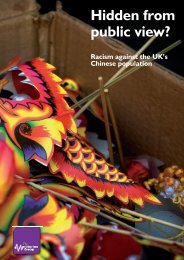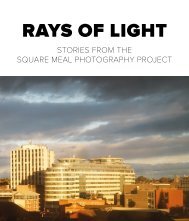Coming of Age : 1976 and the Road to Anti-Racism
Coming of Age : 1976 and the Road to Anti-Racism by Jagdish Patel and Suresh Grover
Coming of Age : 1976 and the Road to Anti-Racism
by Jagdish Patel and Suresh Grover
You also want an ePaper? Increase the reach of your titles
YUMPU automatically turns print PDFs into web optimized ePapers that Google loves.
The menials in <strong>the</strong> kitchen are invariably Asian women — plus a few men, perhaps, for <strong>the</strong> heavier work.<br />
And, <strong>of</strong> course, <strong>the</strong>re is no question <strong>of</strong> promotion. Indeed, <strong>the</strong>y are lucky if <strong>the</strong> agency that employs <strong>the</strong>m does not<br />
sack <strong>the</strong>m <strong>and</strong> re-employ <strong>the</strong>m at some o<strong>the</strong>r terminal, at <strong>the</strong> same wage if not a lower one. Their union, <strong>the</strong> TGWU,<br />
has been indifferent <strong>to</strong> <strong>the</strong>ir dem<strong>and</strong>s <strong>and</strong> in 1975, when 450 Asian workers on <strong>the</strong>ir own initiative, <strong>the</strong> union declared<br />
<strong>the</strong> strike. The women managed, though, <strong>to</strong> elicit a few concessions on <strong>the</strong>ir won – <strong>and</strong> went back <strong>to</strong> work. (53)<br />
The strike at Grunwick Film Processing plant in North London in August <strong>1976</strong> is. <strong>of</strong> course, more celebrated —<br />
not only because <strong>the</strong> Asian workers, most <strong>of</strong> <strong>the</strong>m women from East Africa, sustained it in wet <strong>and</strong> snow <strong>and</strong><br />
police harassment <strong>of</strong> pickets for over a year, but also because <strong>the</strong> whole force <strong>of</strong> <strong>the</strong> unions <strong>and</strong> <strong>of</strong> government<br />
appeared <strong>to</strong> be ga<strong>the</strong>red at last on behalf <strong>of</strong> black workers. Not only were <strong>the</strong> strikers given strike pay<br />
by <strong>the</strong>ir union, but were also supported by <strong>the</strong> national unions — TGWU, TUC <strong>and</strong> UPW (Union <strong>of</strong> Post Office<br />
Workers) — <strong>and</strong> by local union branches, shop steward’s committees, trade councils, <strong>the</strong> lot. And cabinet ministers<br />
appeared on <strong>the</strong> picket lines. The basic issue for <strong>the</strong> strikers was <strong>the</strong> question <strong>of</strong> racist exploitation with<br />
which union recognition was involved, but, in <strong>the</strong> course <strong>of</strong> accepting union support, <strong>the</strong>y also accepted <strong>the</strong><br />
union line that union recognition by management was really <strong>the</strong> basic issue, losing in <strong>the</strong> process <strong>the</strong> lasting<br />
support <strong>of</strong> <strong>the</strong> black community. Union recognition would not have <strong>of</strong> itself got <strong>the</strong> vast backing <strong>of</strong> <strong>the</strong> unions,<br />
let alone that <strong>of</strong> cabinet ministers — it had never happened before — but <strong>the</strong>re was now a deal between <strong>the</strong><br />
government <strong>and</strong> unions (<strong>the</strong> Social Contract) which in exchange for workers not striking ensured, through <strong>the</strong> Employment<br />
Protection Act, that employers did not prevent unionisation. And that put Grunwick in <strong>the</strong> middle <strong>of</strong> it.<br />
As <strong>the</strong> strike dragged on in<strong>to</strong> a year <strong>and</strong> <strong>the</strong> media <strong>and</strong> <strong>the</strong> management <strong>and</strong> its supporters threatened <strong>to</strong> involve<br />
more fundamental political issues such as <strong>the</strong> closed shop <strong>and</strong> <strong>the</strong> mass picket, <strong>the</strong> unions lost interest <strong>and</strong><br />
left. In November 1977 four strikers, two <strong>of</strong> <strong>the</strong>m women, started a hunger strike outside <strong>the</strong> TUC headquarters.<br />
They were immediately suspended by <strong>the</strong>ir union <strong>and</strong> <strong>the</strong>ir strike pay withdrawn. Len Murray, General Secretary<br />
<strong>of</strong> <strong>the</strong> TUC, suggested that <strong>the</strong>y take up <strong>the</strong>ir hunger strike at <strong>the</strong> fac<strong>to</strong>ry gates <strong>and</strong> not outside his <strong>of</strong>fice. (54)<br />
The lessons <strong>of</strong> <strong>the</strong> earlier strikes – that black workers needed <strong>to</strong> rally <strong>the</strong> community behind <strong>the</strong>m <strong>and</strong> from that<br />
base force <strong>the</strong> unions on <strong>to</strong> <strong>the</strong>ir side – had been temporary unlearnt by workers who had not had <strong>the</strong> benefit <strong>of</strong><br />
that tradition. On <strong>the</strong> o<strong>the</strong>r h<strong>and</strong>, <strong>the</strong> persistence <strong>of</strong> Asian women in going on <strong>the</strong> picket lines, month after month,<br />
against <strong>the</strong> pressure <strong>of</strong> <strong>the</strong>ir husb<strong>and</strong>s <strong>and</strong> <strong>the</strong>ir fa<strong>the</strong>rs, <strong>the</strong> deception <strong>of</strong> <strong>the</strong> union <strong>and</strong> <strong>the</strong> attacks <strong>of</strong> <strong>the</strong> SPG – supported<br />
consistently by women’s groups – had established <strong>the</strong> strength <strong>of</strong> <strong>the</strong> emerging black women’s movement.<br />
In 1977 <strong>the</strong> National Front, encouraged by <strong>the</strong>ir performance (in terms <strong>of</strong> <strong>the</strong> percentage <strong>of</strong><br />
votes cast) in previous local elections, staged several marches through black city areas, with<br />
<strong>the</strong> police ensuring for <strong>the</strong>m <strong>the</strong> freedoms <strong>of</strong> speech <strong>and</strong> assembly They were closely attended<br />
by anti-racist groups — <strong>and</strong> black youth <strong>to</strong>ok <strong>the</strong> opportunity <strong>to</strong> s<strong>to</strong>ne both police <strong>and</strong> fascists alike.<br />
In January 1978 Judge McKinnon ruled that Kingsley Read’s pronouncement on Chaggar’s death — ‘One down, one million<br />
<strong>to</strong> go’ — did not constitute incitement <strong>to</strong> racial hatred. ‘In this Engl<strong>and</strong> <strong>of</strong> ours,’ <strong>the</strong> Judge observed, ‘we are allowed <strong>to</strong><br />
have our own views still, thank goodness, <strong>and</strong> long may it last.’ Kingsley Read was <strong>the</strong> head <strong>of</strong> <strong>the</strong> fascist National Party.<br />
60 | <strong>Coming</strong> <strong>of</strong> <strong>Age</strong><br />
<strong>Coming</strong> <strong>of</strong> <strong>Age</strong> Final version 16.10.indd 60 17/10/2017 12:07







